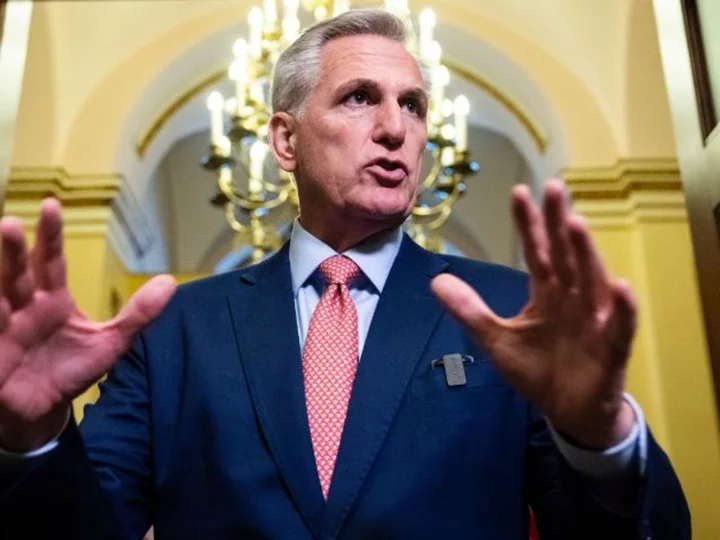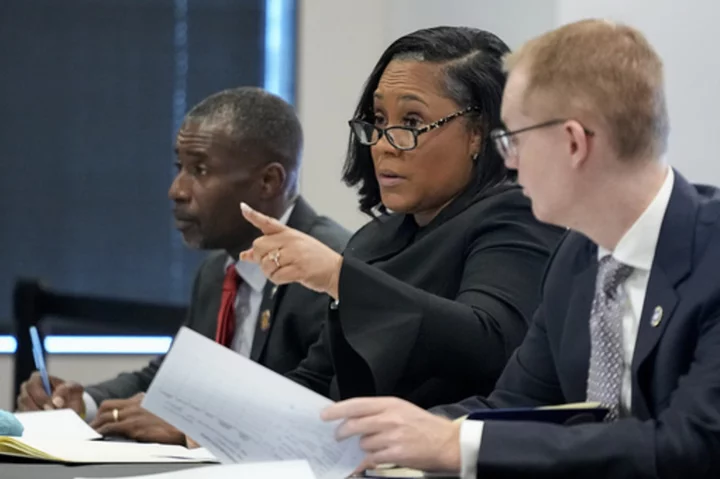Republican leadership is bracing for yet another week where they'll need to unite a splintered conference -- this time on a series of spending bills that will set the tone for an autumn showdown with the United States Senate.
The House is expected to begin votes on two spending measures to fund military construction and veterans' affairs programs as well as agriculture and other related agencies this week, but familiar divisions over spending are rearing their head after members of the right flank have been warning for weeks they need to see more concessions before rallying behind the appropriations bills while some moderates bristled at the prospect of anti-abortion provisions.
A handful of members from the conservative House Freedom Caucus have balked at the spending level in the agriculture bill, arguing it's too high even as one of their own members -- Republican Rep. Andy Harris of Maryland -- shepherded the bill through committee. Leaders are looking at ways to use amendments in the House Rules Committee or on the floor to further slash spending, but it's a delicate balance to ensure they don't lose more moderate members in the process. And there are still questions about whether the votes exist to pass the rule for the military construction bill, which is slated to come up Wednesday afternoon.
Leaders can only afford to lose four votes assuming full attendance.
"We have a lot of very intense conservative friends who'd like to see dramatic cuts, but you have to be practical," Rep. Frank Lucas, a Republican from Oklahoma, said. "We'll see how practical we are this week."
Ahead of the potentially nail-biter votes, leadership has been working to get a better gauge on where the Freedom Caucus stands; members of the hardline group were seen meeting in House Speaker Kevin McCarthy's office Wednesday early afternoon.
Rep. Scott Perry, a Pennsylvania Republican and chairman of the Freedom Caucus, said spending cuts aren't their only concern: they also have questions about the policy in the military spending bill.
Meanwhile, some moderate Republicans have signaled they are opposed a provision in the agriculture and Food and Drug Administration spending bill targeting access to the abortion pill.
The pressure is mounting as the House is expected to wrap up its work and leave town for a month-long recess at the end of the week, giving leadership a narrow window to find a path forward. And even if House Republicans are able to reach a resolution on their own spending bills -- a heavy lift on its own -- they're dead on arrival in the Democratic-controlled Senate, teeing up a massive fiscal showdown later this year that will again put McCarthy's leadership to the test, forcing him to either cut another deal with Democrats that could infuriate his right flank or else see a government shutdown on his watch.
Veteran appropriator Tom Cole when asked if the appropriations bills would pass this week was blunt "I don't know yet, but we'll work them one at a time. If we get milcon VA across, then our chances on ag go up."
In a private meeting Wednesday morning, McCarthy implored his members to stick together, warning it's critical the conference stay united on spending bills, to ensure they have maximum leverage in the fall when they'll have to negotiate with the US Senate, which is moving its bills through committee at far higher spending levels than the House. The Senate, McCarthy argued, is the enemy -- not fellow House Republicans.
It's yet another week in which GOP leaders are confronting the realities of their slim majority. Majority Leader Steve Scalise, a Republican from Louisiana, said Wednesday morning that he was continuing to meet throughout the day with the House Freedom Caucus to find a way forward on the agriculture bill and leaders are watching the rule vote on the military spending bill closely. But even if the House can pass two of the bills on the floor this week, it leaves them 10 more to go when they return in September from the recess and just a handful of legislative days to complete the work before the September 30 deadline. Two of their bills also have yet to make it out of the Appropriations Committee. Consideration of those measures, some of the most contentious, was postponed this week amid still lingering divisions.
Republicans acknowledge they'll likely need to pass a short-term stopgap measure to give them more time to finish the work of funding the government this fall.
And some hardline members are signaling that they'd be comfortable with the prospect of a government shutdown if it achieves their goal of slashing spending and driving down the national debt -- though they insist that a shutdown is not the goal.
"We should not fear a government shutdown," GOP Rep. Bob Good of Virginia said at a news conference this week. "Most of what we do up here is bad anyway."
Rep. Kevin Hern, an Oklahoma Republican and the leader of the Republican Study Committee, told CNN that he would back a so-called continuing resolution if one was needed for a few months and predicted "most members would." But, a short-term bill is only a temporary option. The bill to raise the debt ceiling that passed in June included a provision that would institute an automatic 1% cut on all federal spending under a continuing resolution beginning on January 1 that would go into effect in April of 2024.
Those cuts could be motivating for Senate and House appropriators to come to the negotiating table, but there is still considerable work to be done. Despite the fact that the debt ceiling bill included topline spending targets for the appropriations process, the House has largely marked their bills up at far lower levels than that deal. Meanwhile last week, the Senate negotiators agreed to include an emergency spending package for defense and nondefense spending that would set total spending above the caps deal. The two sides are tens of billions of dollars apart.
One of the promises McCarthy has made to his right flank that could further complicate governing: he vowed to not support a massive, end of year spending bill, known as an omnibus, which is how Congress has tended to fund the government in recent years, given the steep challenges in passing bills individually.
But McCarthy did not rule out the idea of packaging a few spending bills together in order to get them over the finish line.
"There will be times when I have to put more than one bill together," he said. "But I like it more, as much individually as we can in the process."









